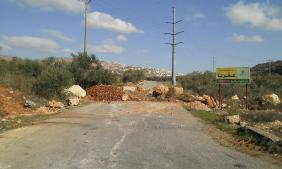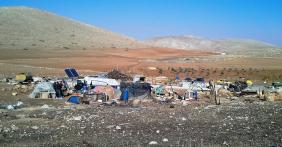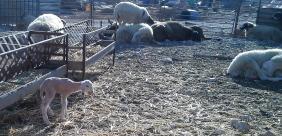Hamra (Beqaot), Ma'ale Efrayim, Za'tara (Tapuah)

Most of our visit took place at Hadidia with Abu Sakker after all of his tents and sheep pen were demolished and building materials were confiscated by the army ten days ago. Following the incident, every tent that was donated to him was confiscated day after day, including plastic sheeting that the family used as cover at night to keep out the rain. We met a lot of people who had come there to offer support, including the columnist Gideon Levy and the photographer Alex Libak who published an excellent article in HaAretz on December 11th.
This is the first day of Chanukah and the settlers are celebrating. East of the Shomron Crossing a group of young people is running along the road with a lot of flags. Later we saw a bus belonging to Chabad several times. Dirt embankments have been erected at the entrances to the villages of Ussrin and Akraba west of the Tapuach junction. One entrance to each village has been left open. Evidently the instructions of the Supreme Court were to leave at least one entrance open in each village for vehicles (such as ambulances) to pass.
What now remains about Hadidia Embankments at the entrance to Akraba


A New Life at Al Hadidia Pedestrian path Hamra Checkpoint


Tapuach Junction / Zatra Checkpoint
A steel barricade blocks the entrance to the road leading to the Palestinian villages south of the settlement of Tapuach.
At Maaleh Ephraim Checkpoint there were no soldiers when we crossed on the way or on the way back.
Hamra Checkpoint 10:15
Three workers who were returning from work were not allowed to cross the checkpoint on foot and had to get into a taxi. There is a sign pointing to a pedestrian path that leads around the checkpoint. Only one lane has been open for a long time and we were told that this was because of lack of manpower. Consequently, even when it is not rush hour there is a waiting line. While we were there cars were waiting in line for 5-10 minutes.
Visit to Abu Sakker in Hadidia
The first problem was approaching Hadidia. The easiest way to get there is to drive from the Alon Route eastward after the settlement of Bikaot. If Jews were living there they would have paved a road to the settlement. However, the road to the Bedouin settlements has been blocked with dirt embankments and the only way to get there is along the road to the settlement of Hemdat. The road is full of rocks and obstacles that endanger any car smaller than a jeep. When it is muddy only tractors can get through. Abu Sakker tried to cover part of the road with gravel, but this was immediately demolished, against court orders.
Many people were present in the area that was once his home to express solidarity. Five young people from the Ecumenical Church were there – some of whom had even stayed there to sleep with the family outside in the rain. They slept under plastic sheeting to protect themselves from the rain, but these were also confiscated.
Abu Sakker is not a young man. He does not look good – he is bearded, has aged, and he is also not well. His wife is also not a young woman, and they have elementary school – aged children. We saw the children arriving from school by transport provided by the Palestinian Authority, despite the fact that this is Area C and the army is supposed to provide all civilian services. Abu Sakker has neighbors – an elderly couple whose tent was also demolished, but who have had less publicity. After the guests leave everyone remains to sleep outdoors.
Later supplement to this report: Several days later we learned that Abu Sakker obtained a temporary order with the help of an Israeli attorney, that prevents the army from demolishing his tents.
